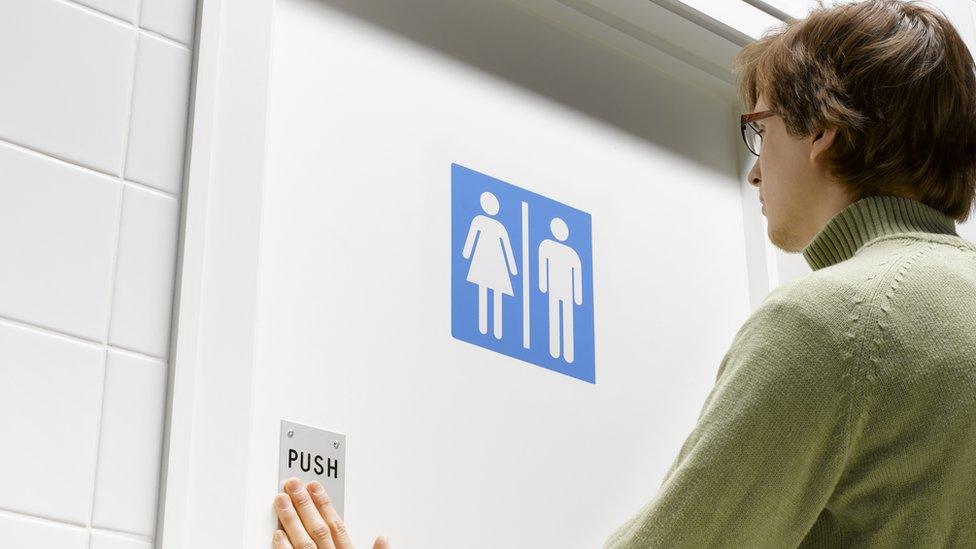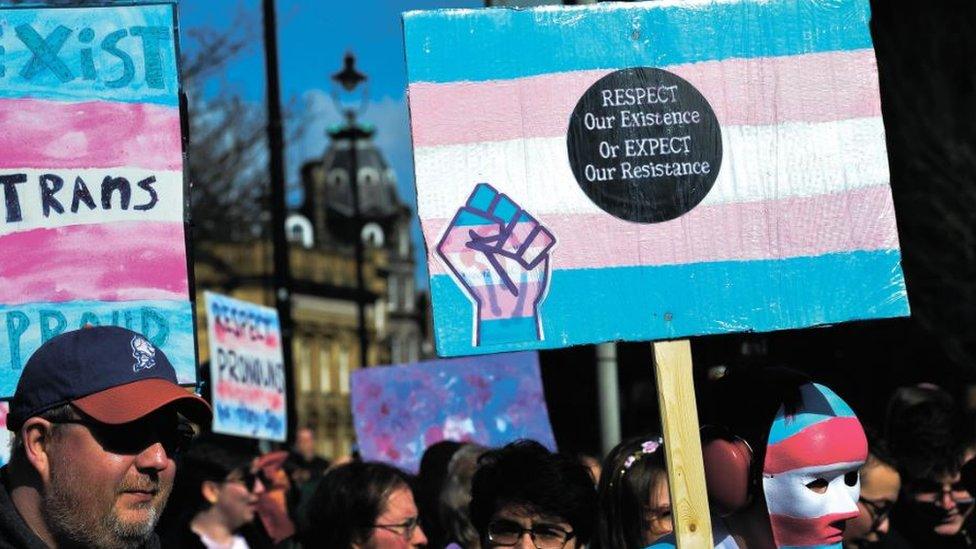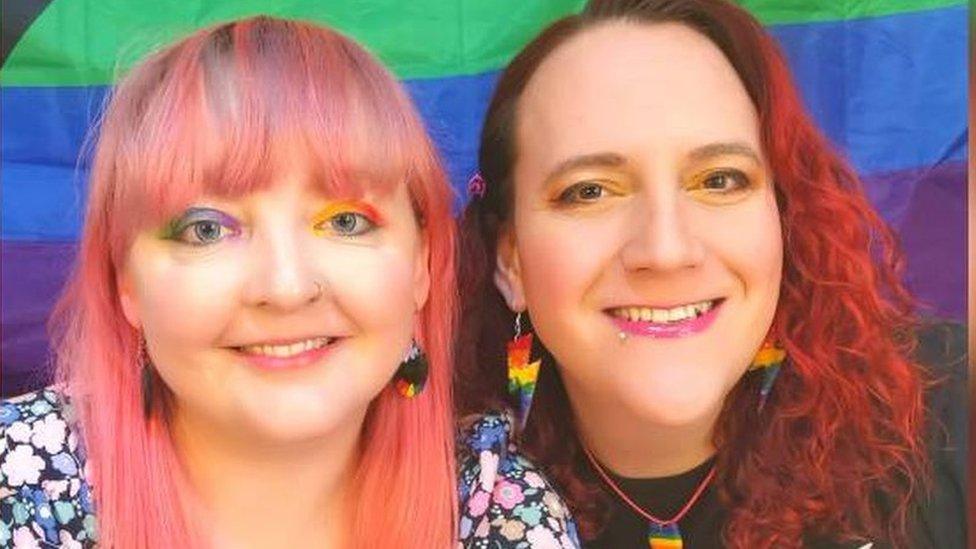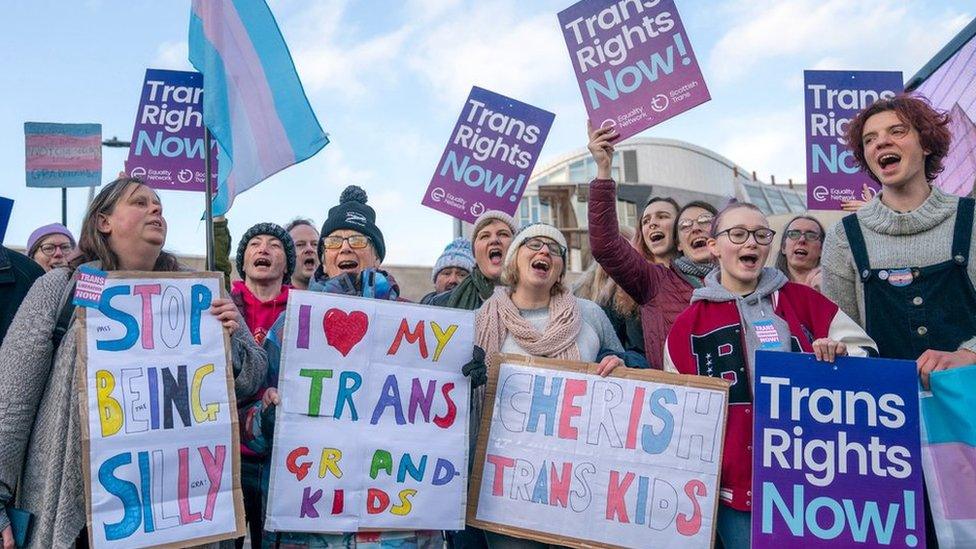Human rights watchdog publishes single-sex spaces guide
- Published

Services such as bathrooms and domestic abuse refuges can be single sex in certain circumstances, Britain's human rights body has said in new guidance.
However, the guidance from the Equality and Human Rights Commission says such services should be open to trans people wherever possible.
Exceptions are only acceptable if there are "proportionate and justified reasons".
The new guidance, external is an interpretation of existing equality laws.
It looks at how single-sex services such as bathrooms and domestic abuse refuges should be run, and transgender people's access to these spaces.
Under the Equality Act 2010, providers cannot discriminate against someone based on sex or gender reassignment, but there are exceptions where access for certain groups can be modified or limited if there is what is described as a "legitimate aim".
This is the first time the EHRC has published guidance with specific examples related to the circumstances where this can be allowed to happen in England, Scotland and Wales.
It would apply whether or not the person has a gender recognition certificate - a legal document that allows someone to change the legal sex on their birth certificate.
One example the watchdog has given about domestic abuse refuges suggests trans women could be barred if biologically female survivors indicated they felt uncomfortable, but a list of alternative support for trans women in the local area should be made available.
Similarly, in a gym with separate-sex changing rooms if there was concern over the safety and dignity of trans men in a communal area, an extra gender-neutral changing room with private units could be introduced.
Announcing the guidance, the EHRC were keen to clarify they were not addressing the "wider debate" on sex and gender identity and that their guidelines are intended to help service providers interpret existing equality law.
Baroness Kishwer Falkner, chair of the EHRC, said she thinks the advice will help "uphold everyone's rights."
She said: "There is no place for discrimination against anyone based on their sex or gender reassignment.
"Organisations are legally allowed to restrict services to a single sex in some circumstances. But they need help to navigate this sensitive area. That is why we have published this guidance - to clarify the law and uphold everyone's rights."
But the response from charities and campaigners suggests the rules could still be open to interpretation.
LGBT+ campaigning charity Stonewall has criticised the announcement, claiming it will lead to "more confusion".
A Stonewall spokesperson said: "Far from clarifying how the single sex exemptions in the Equality Act should be used, the EHRC's latest non-statutory guidance is likely to create more confusion.
"It appears to go against the core presumption of the act which is that inclusion should be the starting point, and shifts the focus towards reasons trans people, and specifically trans women, can be excluded."
While gender critical organisation Sex Matters has welcomed the move and called it a "straightforward explanation".
Maya Forstater, executive director of Sex Matters, said: "The EHRC's straightforward explanation should help service providers avoid the difficulties currently plaguing politicians when they are asked questions about the difference between sex and gender identity".
The guidance has been released following the news that the EHRC's status as an A-class human rights institution is to be reviewed later this year.
There had been calls from some LGBT+ campaign groups and charities for a special review after accusations they were influenced by the UK government in the appointments of the chair and board members. The EHRC previously told the BBC it takes all decisions impartially and all appointments made through a fair, open and transparent recruitment process.
However the BBC understands calls for a special review were rejected by The UN and instead a pre-planned review, which was already scheduled for later this year, will go ahead.
Evidence submitted by campaigners will be heard as part of the review, and other interested groups will be invited to submit evidence as early as next week.
If a review does find they should be downgraded, the EHRC would be prevented from being able to make representations at the UN Human Rights Council, or its committees on human rights.

THE GREATEST BOXER IN HISTORY: The incredible life of Muhammad Ali
THE BEST AT BEING BAD: Celebrating the British actors are who so good at being bad

Related topics
- Published11 February 2022

- Published1 April 2022

- Published8 December 2023
